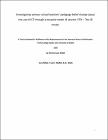| dc.identifier.citation | Walsh, Dermot Louis, Investigating primary school teachers' pedagogy belief change about the use of ICT through a bespoke model of teacher CPD - The 4D Model, Trinity College Dublin, School of Computer Science & Statistics, Computer Science, 2024 | en |
| dc.description.abstract | This study focuses on teachers' pedagogy beliefs and their relationship with ICT as a critical factor in determining teachers' classroom practice. Recent insights into the relationship can enhance CPD design in this area. Whereas recent insights into the relationship argue that it is bi-directional, multi-dimensional and in need of support, traditional teacher CPD promotes one-directional, unidimensional teaching and learning approaches and provides little support for teachers to persist with new practice at school. To address these conflicts, a new model of teacher CPD - the 4D Model, which engages teachers in raising, experimenting, reflecting, and refining beliefs - was designed to investigate how and why teachers grow beliefs and practices during the co-creation, implementation, and evaluation of teaching and learning activities. An exploratory-explanatory case study approach was taken to investigate this issue through an interpretivist, constructivist lens. Eight primary school teachers participated in the study. Qualitative data was collected in the form of metaphor construction and reconstruction, lesson plans, and individual and group interviews. Data were analysed using open and axial coding and category construction using qualitative techniques. Findings demonstrate the 4D model's efficacy in growing and changing teachers' beliefs and practices about using ICT to support students' development of 21st Century skills at school. Five categories pertaining to how and why teachers' changed beliefs emerged from the data analysis. Categories include Changing beliefs and practice with ICT, Teamwork, Co-creating, implementing, and evaluating from multiple orientations, Roles, and Managing feedback, and they provided insights into the participants' belief change. The findings indicated that teachers strengthened or reconstructed beliefs by resolving conflicts between novel and existing practice; furthermore, there are insights into beliefs interconnectedness, multi-dimensionality, bidirectionality, the process of belief change, and how working as part of a teacher design team enables teachers to develop persistence with creative and innovative ICT use at school. The study makes two contributions to the literature. The first is a bespoke model of teacher CPD for changing teachers' pedagogy beliefs about the use of ICT - the 4D Model. The second is the metaphor construction and reconstruction process. | en |




